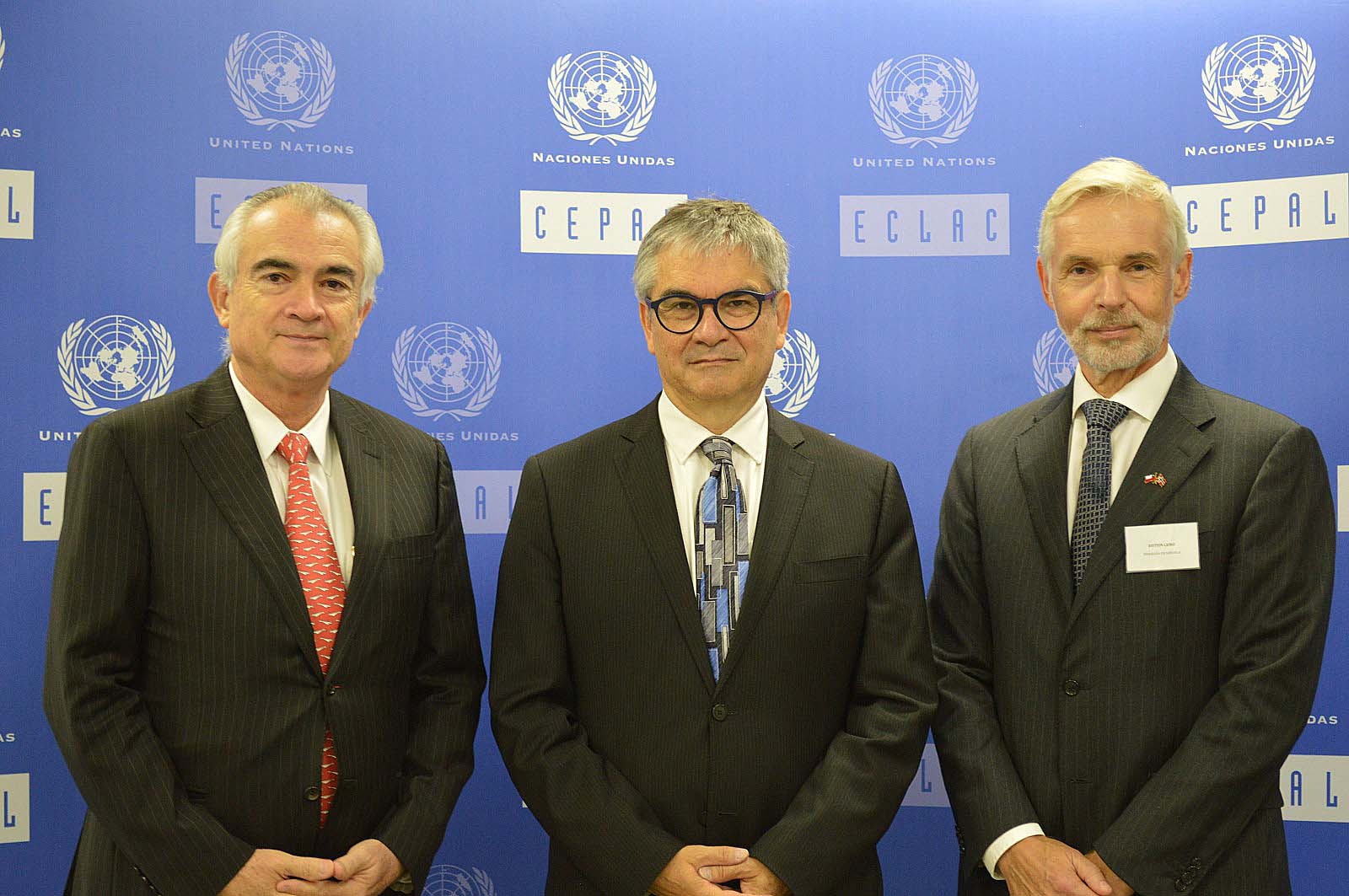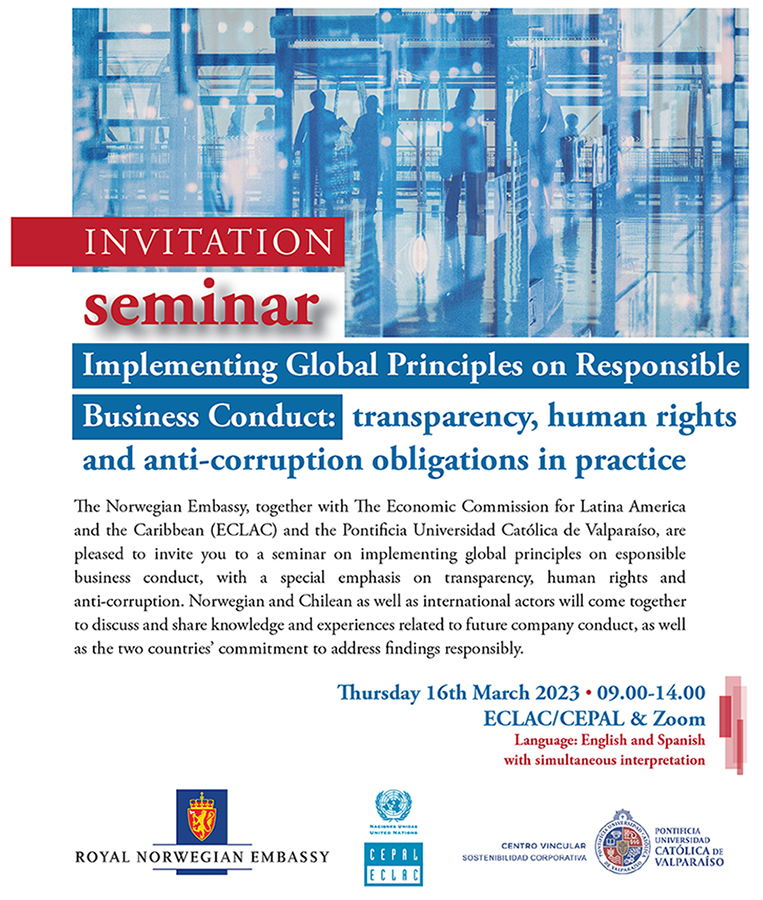Implementing Principles on Responsible Business Conduct is Crucial for Moving Towards Sustainable Development in the Region
Work area(s)
Representatives of government, international organizations, the private sector and civil society participated in a seminar organized by the Norwegian Embassy in Chile, the Pontificia Universidad Católica de Valparaíso and ECLAC.

The implementation of global principles on responsible business conduct in Latin America and the Caribbean – especially those relating to transparency, human rights and anti-corruption obligations – is crucial for moving towards sustainable development in the region, according to the participants in the seminar Implementing Global Principles on Responsible Business Conduct: transparency, human rights and anti-corruption obligations in practice, held this Thursday, March 16, at the headquarters of the Economic Commission for Latin America and the Caribbean (ECLAC) in Santiago, Chile.
At this event, organized by the Norwegian Embassy in Chile, the Pontificia Universidad Católica de Valparaíso and ECLAC, information was provided on the Norwegian Transparency Act, which entered into force on July 1, 2022 and which requires Norwegian companies, whether they operate at home or abroad, to conduct due diligence processes.
The opening remarks were made by Mario Marcel, Minister of Finance of Chile; Jan Christian Vestre, Minister of Trade and Industry of Norway (by video); Jostein Leiro, Norway’s Ambassador in Chile; and José Manuel Salazar-Xirinachs, ECLAC’s Executive Secretary.
“Trade and financial openness and the growing physical and technological interconnectedness of markets over the last few decades have opened up new dimensions of development for companies, where adding value in productive processes of goods and services is no longer enough. Adopting principles of responsible business conduct is essential,” Mario Marcel, the Minister of Finance of Chile, indicated.
“The speed with which Chile’s important trading partners are moving to establish obligatory regulations in these areas, including supply chains, shows that every nation’s future growth critically hinges on the agile adoption of these principles,” he stressed.
José Manuel Salazar-Xirinachs, ECLAC’s Executive Secretary, thanked the government authorities and other representatives of Chile and Norway (a Member State of the Commission since 2015) for their presence, and then highlighted both countries’ commitment to sustainability and the fight against climate change.
“For urgent transformations to take place, it is necessary to have suitable public policies and also an active private sector, which can flex investment muscle,” ECLAC’s highest authority emphasized, adding that “there is no doubt the region needs to reactivate investment and growth” due to the complex global and regional scenario, with several interconnected crises and an unexpected war in Europe.
“But this is not about just any kind of investment or growth,” José Manuel Salazar-Xirinachs stressed. “In Latin America and the Caribbean, we need to innovate and make our productive apparatus more sophisticated and diversified, with a view to sustainability. The region needs decent working conditions that comply with human rights, as the Norwegian Transparency Act reminds us.”
It is foreseeable, he said, that the due diligence obligations imposed on European companies will have a positive impact on the standards applied in Latin America and the Caribbean. “Getting behind transparency and human rights is not only correct and morally imperative, it is also strategic,” ECLAC’s Executive Secretary stated.
“Events such as today’s give us the opportunity to learn from one another and create even stronger ties, which can pave the way for more trade and investment between Norway and Chile, and between Europe and South America,” said Norway’s Minister of Trade and Industry, Jan Christian Vestre, adding: “When companies take transparency seriously, they earn our trust. When companies earn our trust, they get a competitive advantage. And when companies have a competitive advantage, they grow and prosper.”
Based on the OECD Guidelines for Multinational Enterprises and the UN Guiding Principles on Business and Human Rights, Norway passed its own transparency law for companies last year, in close collaboration with civil society and the business community, Minister Jan Christian Vestre indicated.
“I understand that in Chile, as in other countries of the region, officials are evaluating developing various strategies and regulations on the matter of companies, the economy and human rights. For Norway, certainly, this work is continually developed,” Norway’s Ambassador in Chile, Jostein Leiro, sustained.
The diplomat explained that the new transparency law in his country “requires Norwegian companies, whether they operate in Norway or abroad, to conduct due diligence processes in the areas of human rights and working conditions along their entire supply chain” and allows “consumers to obtain information about this process and its findings.”
The seminar included a keynote address by economist Jeannette von Wolfersdorff, from the Autonomous Fiscal Council of Chile, on the importance of transparency and the role that industry plays in promoting human rights and fighting corruption, as well as three panels on international guidelines and national legislation on transparency; responsible business conduct in practice; and business conduct and multi-stakeholders.
The event’s closing remarks were made by Dante Pesce, Executive Director of the Centro Vincular of the Pontificia Universidad Católica de Valparaíso, who summarized the day’s discussions, highlighting the Norwegian perspective that links trust-building to an increase in competitiveness, along with the long process for implementing the principles of responsible business conduct in that country, which led to the recent adoption of the transparency law.
Related content
Type
Country(ies)
-
Chile
- Latin America and the Caribbean
-
Norway
Contact
Public Information Unit
- prensa@cepal.org
- (56 2) 2210 2040
